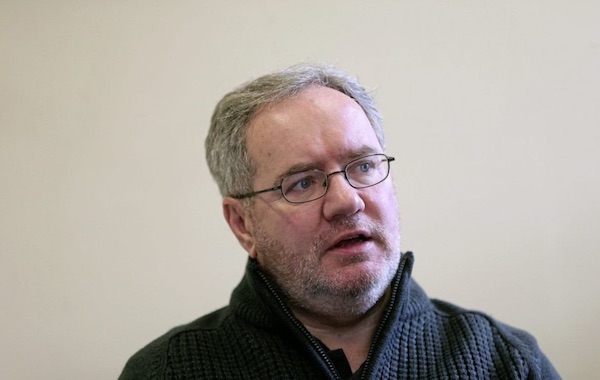
A Court of Appeal in Belfast has ruled that the British Crown Forces fabricated admissions in 1978 to secure the conviction of a teenager which saw him locked away for ten years of his early adulthood.
After a lifelong campaign, the 20-year sentence against west Belfast man Michael Devine was overturned this week. The miscarriage of justice was revealed only after a lifelong personal campaign for the truth.
The court ruled that Michael Devine’s convictions on IRA charges were all unsafe. The 58-year-old said: “I feel vindicated and exonerated, but this has been a long time coming. I have lost 10 years of my life.”
His case was referred to the Court of Appeal by the body which examines potential miscarriages of justice, but only after a number of attempts. The Criminal Cases Review Commission finally accepted the existence of a number of exonerating factors, including the absence of standards of fairness in the police interview process. Questions were also raised about ‘confidential’ material passed to the judge at the time.
Following a brief hearing Justice Declan Morgan said the case had “generated some concern” and confirmed the appeal is to be allowed.
“Those reasons are sufficient to cause us to consider that the conviction is unsafe,” he ruled.
A full written judgment is to be delivered at a later date. Mr Devine, who was released from the H-Blocks in 1989, has always maintained his innocence and has fought to have the convictions overturned.
Outside court, he said: “The evidence used to convict me was a verbal admission at interview which I always denied making.”
Mr Devine said he had raised concerns about the practice known as ‘verballing’ with officers at the time. ‘Verballing’ refers to putting damaging remarks into the mouths of suspects during interrogation.
Complaints that he raised about the particular conduct of one officer were also ignored. “He fabricated evidence against me and swore on it in court,” Mr Devine said.
Justice Morgan and his two colleagues reached their decision less than an hour after the case opened in Belfast on Monday.
Mr Devine said: “This was a miscarriage of justice, but it’s not just me. There are other people out there who suffered a similar fate on the basis of police wrongdoing.
“I’m fortunate that the injustice inflicted on me has been exposed and corrected, so this is a day for celebration.”
Mr Devine was in court in Belfast when his name was finally cleared after almost four decades.
“I felt it’s been a struggle this past ten years and for me the overriding feeling was one of being vindicated,” he said. “My truth has now come out.”
After being released from prison he tried to make a life for himself.
“I got on with my life but that is a difficult thing to do when you have a conviction,” he said. “That has never went away.
“I applied for course at university have applied for jobs and I have been successful in doing that but it has always been a battle.
“Because those convictions linger to this day and people don’t realise what that’s like for ex-prisoners, particularly ex-prisoners who are maintaining their innocence.”
Mr Devine said the price of having a conviction is “a cost that you continually pay” and the impact continues to the present day.
“Any job you go for, any promotion you go for it’s standard practice that you must declare (your conviction),” he said. “And that’s not just me, that’s every prisoner.
“People are quick to think that when people go to prison then they get out and get on with their lives. But they are penalised, the ex-prisoner community.”
Mr Devine believes that he has been denied opportunities and has encountered discrimination as a result of his wrongful conviction.
He revealed how he took a judicial review against authorities after he was refused a taxi licence on his release from prison.
“I went to Queen’s University to study for a degree and I had to be interviewed before they accepted me because of my conviction,” he said.
“I wanted to work as a part-time taxi driver to put myself through university. I had to take them to court - they refused me a taxi licence.”
Despite the obstacles placed in his way he has obtained several university qualifications and holds a degree in economics, another in youth and community work and a masters degree in social work.
He also reveals the emotional cost of his wrongful conviction and how he was refused bail to attend his father’s funeral.
“For me every son has a right to bury their father and I was denied that right,” he said. “That rankles with me today.”
* In a separate development, another west Belfast man, Kevin McLaughlin, has had his wrongful conviction last year overturned after he was found guilty of possessing arms without any proof he ever came into contact with them.
In March 2019, he received a five-and-a-half year sentence after being arrested in connection with activity by breakaway IRA groups.
Mr McLaughlin had no links to the house that was searched, but the prosecution claimed DNA was present on some of the bags containing weapons.
His lawyers successfully appealed the convictions on the basis the DNA evidence was insufficient, and noted there was nothing to forensically link the defendant to any of the ammunition or components.
Senior judges at the Court of Appeal agreed that there was no forensic evidence linking Kevin McLaughlin to the offences, and confirmed that the convictions for which the 39-year-old had been jailed are to be quashed.
![[Irish Republican News]](https://republican-news.org/graphics/title_gifs/rn.gif)
![[Irish Republican News]](https://republican-news.org/graphics/title_gifs/harp.gif)

